Ryobi Track Saw
If you’re into woodworking, cabinetry, or just serious about your DIY game, the Ryobi track saw is a tool that deserves your attention. Designed for precision, portability, and power, the Ryobi track saw combines the functionality of a table saw with the flexibility of a circular saw—without the bulk.
Ryobi Track Saw: The Ultimate Guide for DIYers and Professionals
If you’re into woodworking, cabinetry, or just serious about your DIY game, the Ryobi track saw is a tool that deserves your attention. Designed for precision, portability, and power, the Ryobi track saw combines the functionality of a table saw with the flexibility of a circular saw—without the bulk.
In this comprehensive guide, we’ll explore everything you need to know about the Ryobi track saw, including its key features, performance, accessories, comparisons with other brands, and why it might be the perfect addition to your workshop.
What Is a Track Saw?
Before diving into the specifics of Ryobi’s version, let’s quickly define what a track saw is.
A track saw, also known as a plunge saw, is a circular saw that runs along a specially designed rail or track. This setup allows for perfectly straight, splinter-free, and accurate cuts in sheet goods like plywood, MDF, melamine, or even solid wood.
Unlike a table saw, which brings the material to the blade, a track saw brings the blade to the material—making it safer and more mobile for jobs in tight spaces or on-site.
Overview of the Ryobi PTS01K Cordless Track Saw
One of the most popular models from Ryobi is the Ryobi PTS01K. This 18V ONE+ cordless track saw brings a professional-grade plunge saw experience to hobbyists, carpenters, and contractors alike—at a budget-friendly price.
🔧 Key Specifications:
-
Model: Ryobi PTS01K
-
Battery platform: 18V ONE+ (works with all Ryobi ONE+ batteries)
-
Blade size: 5-1/2 inches
-
Cut depth: Up to 1-15/16 inches at 90°, 1-7/16 inches at 45°
-
No-load speed: 4,300 RPM
-
Bevel capacity: 0°–47°
-
Track compatibility: Ryobi 55″ track system
-
Dust port: Compatible with most shop vacs
-
Weight: ~7 lbs (tool only)
Why Choose the Ryobi Track Saw?
✅ 1. Budget-Friendly Without Compromise
Ryobi has long been known for offering great value, and the PTS01K is no exception. While professional track saws from brands like Festool or Makita can cost over $600, Ryobi delivers a reliable alternative for under $300 (including the track in some kits).
✅ 2. Cordless Convenience
The Ryobi track saw is part of the 18V ONE+ ecosystem, meaning if you already own Ryobi tools, you likely have compatible batteries. No more dragging cords across your work surface or searching for outlets.
✅ 3. Precision Cutting
With its included splinter guard, adjustable track alignment, and depth settings, the Ryobi track saw provides clean, controlled cuts with minimal tear-out. It’s ideal for cabinetmakers, furniture builders, and flooring installers.
✅ 4. Bevel and Depth Adjustments
Need angled cuts? The Ryobi track saw bevels up to 47°, and its plunge mechanism offers precise control for blind cuts or cut-outs.
✅ 5. Dust Management
The built-in dust port helps maintain a clean workspace and minimizes airborne debris—especially when hooked up to a vacuum.
Performance Review: How Does the Ryobi Track Saw Stack Up?
⚙️ Power and Motor
Though not brushless, the 18V motor delivers adequate cutting power for most sheet goods, hardwoods up to 2″ thick, and even some light-duty crosscuts in dimensional lumber. It’s not designed to replace a cabinet saw, but it will impress for its size and price point.
🔩 Build Quality
The housing is made of durable plastic with solid metal components in key structural areas. The plunge mechanism feels smooth and locks firmly into place. The base plate aligns well with the track, ensuring accurate repeat cuts.
🪚 Cut Quality
With a high-quality blade (preferably a 40T or higher tooth count), users report clean, tear-free edges. Using the correct scoring technique can also improve results on melamine and veneered plywood.
Ryobi Track Saw Accessories and Add-Ons
🛠️ 1. Ryobi 55″ Track Kit (A73TS01)
Ryobi’s dedicated track system features anti-slip strips, splinter guards, and adjustable track connectors. Additional track segments can be added for extended cuts.
🛠️ 2. Clamps
Ryobi offers track-compatible clamps, though many aftermarket options from brands like Bora or Makita also work well.
🛠️ 3. Guide Rail Connectors
For longer cuts, you can combine multiple track pieces using Ryobi’s guide rail connectors to create a seamless track up to 110 inches or more.
🛠️ 4. Dust Adapter
If your vacuum hose doesn’t fit snugly into the dust port, Ryobi provides a universal adapter to connect with most shop vac systems.
Applications: What Can You Do with a Ryobi Track Saw?
🔨 Cabinet Making
Make precise panel cuts for cabinet sides, backs, and doors. Clean edges mean less sanding and better glue joints.
🏠 Trim Carpentry
Use the track saw for precise miters and bevel cuts when installing baseboards, crown molding, or door casing.
🪵 Furniture Building
Perfect for ripping hardwood or softwood panels, making book-matched cuts, or squaring large pieces of plywood.
🧰 Jobsite Work
Instead of hauling around a heavy table saw, the Ryobi track saw lets you cut sheet materials right on the floor or sawhorses.
How to Use the Ryobi Track Saw: Step-by-Step
Step 1: Set Up the Track
Place the track where you want the cut. Ensure the non-slip strips are in contact with the material. Use clamps if necessary.
Step 2: Adjust Cut Depth
Set the cut depth using the easy-to-read scale. Add 1/8” for the thickness of the track.
Step 3: Align Your Cut
Align the splinter guard to your cut line. The edge of the guard should line up exactly with the blade path.
Step 4: Make the Cut
Press the plunge button, start the saw, and gently feed it along the track while maintaining steady pressure.
Step 5: Bevel (Optional)
If making bevel cuts, tilt the base to your desired angle, lock it in place, and cut as usual.
Ryobi Track Saw vs. The Competition
| Brand | Power Source | Price Range | Notable Feature | Best For |
|---|---|---|---|---|
| Ryobi | 18V Battery | $$ | Affordable + cordless | DIYers |
| Festool | Corded | $$$$$ | Precision + accessories | Pros |
| Makita | Corded/Batt | $$$$ | Dual power + build | Pros |
| DeWalt | Cordless | $$$$ | Tough build, brushless | Pros |
| Kreg | Corded | $$$ | Simple for beginners |

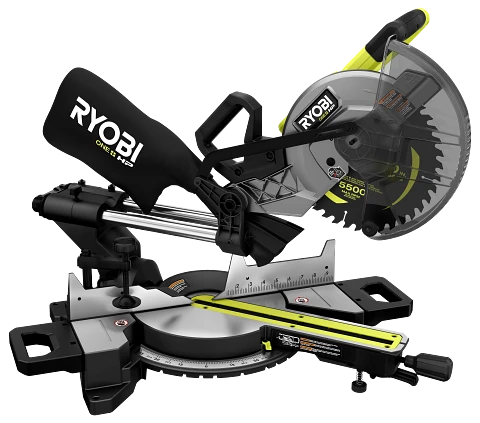
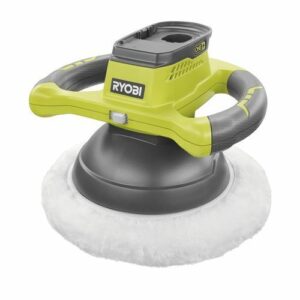
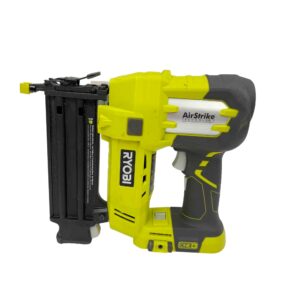
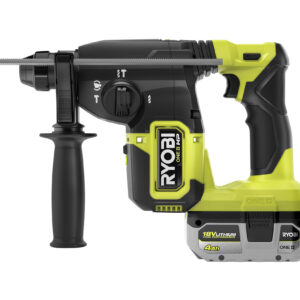
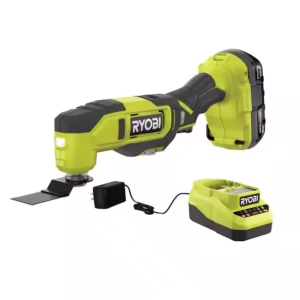
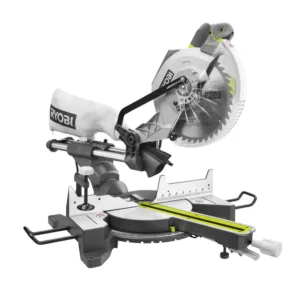
There are no reviews yet.